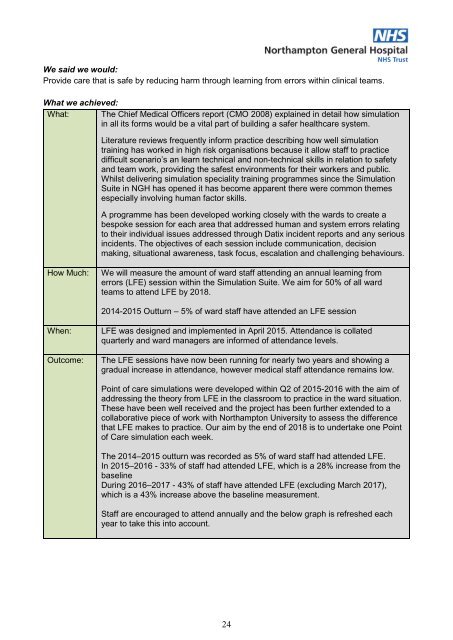Northampton General Hospital NHS Trust Quality Account 2016-2017
Northampton General Hospital NHS Trust Quality account 2016-2017
Northampton General Hospital NHS Trust Quality account 2016-2017
Create successful ePaper yourself
Turn your PDF publications into a flip-book with our unique Google optimized e-Paper software.
We said we would:<br />
Provide care that is safe by reducing harm through learning from errors within clinical teams.<br />
What we achieved:<br />
What: The Chief Medical Officers report (CMO 2008) explained in detail how simulation<br />
in all its forms would be a vital part of building a safer healthcare system.<br />
Literature reviews frequently inform practice describing how well simulation<br />
training has worked in high risk organisations because it allow staff to practice<br />
difficult scenario’s an learn technical and non-technical skills in relation to safety<br />
and team work, providing the safest environments for their workers and public.<br />
Whilst delivering simulation speciality training programmes since the Simulation<br />
Suite in NGH has opened it has become apparent there were common themes<br />
especially involving human factor skills.<br />
A programme has been developed working closely with the wards to create a<br />
bespoke session for each area that addressed human and system errors relating<br />
to their individual issues addressed through Datix incident reports and any serious<br />
incidents. The objectives of each session include communication, decision<br />
making, situational awareness, task focus, escalation and challenging behaviours.<br />
How Much:<br />
We will measure the amount of ward staff attending an annual learning from<br />
errors (LFE) session within the Simulation Suite. We aim for 50% of all ward<br />
teams to attend LFE by 2018.<br />
2014-2015 Outturn – 5% of ward staff have attended an LFE session<br />
When:<br />
Outcome:<br />
LFE was designed and implemented in April 2015. Attendance is collated<br />
quarterly and ward managers are informed of attendance levels.<br />
The LFE sessions have now been running for nearly two years and showing a<br />
gradual increase in attendance, however medical staff attendance remains low.<br />
Point of care simulations were developed within Q2 of 2015-<strong>2016</strong> with the aim of<br />
addressing the theory from LFE in the classroom to practice in the ward situation.<br />
These have been well received and the project has been further extended to a<br />
collaborative piece of work with <strong>Northampton</strong> University to assess the difference<br />
that LFE makes to practice. Our aim by the end of 2018 is to undertake one Point<br />
of Care simulation each week.<br />
The 2014–2015 outturn was recorded as 5% of ward staff had attended LFE.<br />
In 2015–<strong>2016</strong> - 33% of staff had attended LFE, which is a 28% increase from the<br />
baseline<br />
During <strong>2016</strong>–<strong>2017</strong> - 43% of staff have attended LFE (excluding March <strong>2017</strong>),<br />
which is a 43% increase above the baseline measurement.<br />
Staff are encouraged to attend annually and the below graph is refreshed each<br />
year to take this into account.<br />
24


